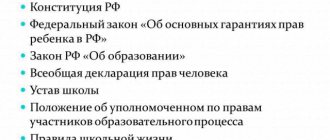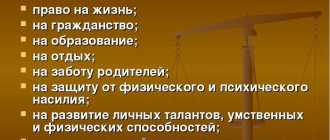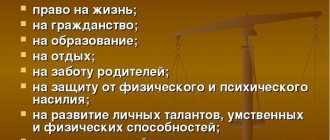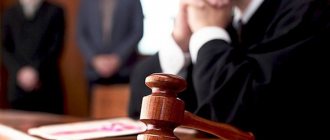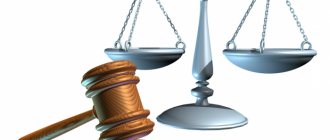From birth, the baby learns to evaluate himself and his life from the point of view of the subjective assessments of an adult living nearby. Any negative manifestation on the part of the parents causes the child to fear the severance of social ties, and leads to the internal conflict “I am society”, laying down a number of complexes, and even causing harm to the child’s psyche. Often negative assessments are accompanied by physical impact, in the form of spanking. Violation of children's rights is much more common than it might seem. And the need to perceive a small member of society as a full-fledged individual is often ignored. Legislation in the field of family and childhood protection is called upon to correct the situation and protect young citizens from encroachments.
Fundamental rights of the child under Russian legislation and international law
A number of legislative acts are intended to consolidate a number of fundamental rights of a minor and regulate the process of their implementation: from the Convention on the Rights of the Child and the Constitution of the Russian Federation to internal regulations of the Commission on Minors' Affairs. The priority of a legislative act at any level should be to respect the interests of minors.
The regulations highlight the following rights of the child:
- to be free from discrimination based on age;
- to life, name and citizenship, family and parental care;
- to information, freedom of thought, opinion and expression;
- to choose and practice religion;
- to the aid and protection of the state;
- for social security and health care;
- for education and recreation.
At the same time, the state is assigned the obligation to protect children's rights. Criminal penalties such as the death penalty and life imprisonment are not applied to minors. Minors have the right to a reduction in the amount of punishment for a crime committed. In cases established by administrative and criminal legislation, adolescents are exempt from liability for committing offenses and crimes due to not reaching the age of responsibility.
In addition, it is prohibited to use humiliating punishments, torture and physical violence against minors. Every minor has the right to protection in the event of armed conflicts.
The concept of violation of children's rights under the civil code
From the point of view of Civil Law, a small citizen, from birth, is a subject of civil legal relations. Due to his minor age, a legal representative acts on his behalf.
The rules of civil law, in particular, are aimed at regulating the process of concluding transactions on behalf of a minor. The function of the Civil Code of the Russian Federation to protect the legal rights and interests of minors is realized in responsibility for causing physical and moral suffering to a child, psychological harm, as well as humiliation of his honor and dignity.
What child rights are most often violated?
The living environment has a direct bearing on the question of which child rights are violated most often. From birth, the child is surrounded by parents and close relatives. The responsibilities of parents include caring for his mental, physical, spiritual and moral health. However, family education methods passed down from generation to generation often include physical punishment for the slightest offense. It is worth noting that any kind of influence in the form of a slap on the butt or a slap on the head is physical violence, unacceptable for use, even for educational purposes.
In addition to physical violence, psychological violence in the form of shouting, swearing, and insults is often used against a child with a fragile psyche. Parents' refusal to communicate is also a type of psychological violence against a child.
Parents do not take into account that the baby is already an individual person. Leaving the child’s opinion unattended in resolving family issues is a violation of his rights. The result of the impact of such treatment on the child’s psyche is impossible to predict. The child may become embittered, lose trust in others, or become completely withdrawn. Children's health suffers and the child's development is harmed. At the same time, his rights to protection from violence, cruel treatment and abuse by loved ones are maliciously violated.
Difficult relationships in the family, divorce of parents, are often a prerequisite for violation of the rights to communicate with relatives. During the divorce process, a minor often becomes a bargaining chip, a means of psychological pressure on the spouse and an opportunity to obtain larger property. They use bans on communication, hiding the child from relatives, in violation of his legal rights and interests. Although the child has a legally established opportunity to communicate with mom, dad and other relatives.
A parent's refusal to provide maintenance and pay alimony is a direct violation of the property rights of a minor.
A minor, due to his age, naivety and age-related developmental characteristics, is not able to understand the extent of the violation of his rights. Often, being in a dependent position on the offender, the child finds himself in a situation of helplessness, the only way out of which is the intervention of government authorities.
Basic rights of minors
Article 11 of the RF IC defines fundamental rights that cannot be violated without legal consequences. Among them are:
- The right to live and be raised in a family. Every child is obliged to live with his mother and father and receive due attention, care and guardianship from them. The exception here would be situations where damage is caused to life or health. If for some reason the child cannot live with his parents, he will be placed in special children's institutions or foster families.
- The right to free communication with family. In accordance with the current provisions of the RF IC, a minor has every right to maintain relations with all relatives on the father’s and mother’s side. In the event that someone restricts communication with grandparents and other close relatives, this act will be recognized as a violation, and the perpetrator will face certain penalties. The only exception here will be situations where contact with relatives negatively affects children and may lead to the creation of dangerous conditions for the health or life of a minor.
- The right to receive a first name, last name and patronymic. All children have the right to identification, that is, to receive a last name, first name and patronymic. In the event that the parents cannot reach a consensus, the guardianship authorities can enter into the dispute and resolve the conflict in accordance with the powers vested in them to counter the infringement of rights.
- The right to freedom of choice and own opinion. Children are completely comfortable expressing their thoughts and opinions in writing or orally without fear. In the event that freedom of speech is infringed, the court can hold the perpetrator accountable in accordance with the provisions of the administrative legislation of the country. As soon as the child turns 10 years old, his opinion will be taken into account at the official level, including by the courts and government agencies.
- The right to receive the necessary means for subsistence. According to the laws, parents are obliged to provide their child with all the necessary resources that he may require. If the parents are divorced, their child must receive monthly cash payments from the parent who lives separately. If there are problems with alimony payments, the court will side with the minor and classify this violation as a serious offense.
- The right to normal development and education. Once a child reaches the required age, he must attend educational institutions. If his rights are violated and parents prevent him from entering school, they will be held accountable.
All children’s rights are enshrined at the highest legislative level, and persons who, due to certain circumstances, encounter minors are obliged to ensure that they are not violated in any way. If it is determined at school that a student is being subjected to physical or mental violence, teachers are obliged to immediately report the identified facts to the guardianship authorities.
Examples of violations of children's rights
Under the guise of the external well-being of the family, not only the use of unacceptable methods of education, cruel treatment, but even the complete deprivation of children of their livelihood can be hidden.
A striking example of a violation of a child’s rights is a situation where a mother with a drug addiction leaves home for two days, leaving three young children without food and livelihood, thereby putting their lives and health in danger. Another careless mother pours alcohol into the baby’s bottle so that he can sleep while she has guests.
A cruel father, he raises his son with a belt for getting a bad grade in his diary, and then locks him in a room with textbooks, leaving him without lunch.
Infringement of children's rights occurs not only in the family. As a person grows and develops, he acquires wide social connections, including home, school, street friends, neighbors on the street, acquaintances from clubs and sections. The likelihood of rights violations is highest in places of long-term stay.
Arbitrage practice
Article 57 of the Family Code of the Russian Federation speaks of the right of a small citizen to express his opinion when resolving any issue in the family, as well as to have the right to be heard during judicial or administrative proceedings, provided that the child reaches the age of ten years, except in cases contrary to his interests.
However, during the study of judicial practice, violations are often revealed, associated, for example, with the consideration of cases on determining the place of residence of a child in the event of separation of his parents, when the opinion of a child who has reached the age of ten with whom he wants to live is not taken into account.
Thus, one of the courts of the Perm Territory made a decision to determine the place of residence of a twelve-year-old teenager, while the opinion of the child himself was not taken into account by either the guardianship and trusteeship authorities or the court, and the decision itself was not motivated by the court in any way.
Also, judicial practice speaks of cases when the court does not take into account the opinion of the child, when parents in court enter into an amicable agreement on the child’s place of residence , thereby violating the requirements of Art. 57 RF IC.
A striking example of such a violation is the approval by a judge of one of the Novosibirsk courts of a settlement agreement between the parents of two minor children. At the same time, the place of residence of the 13-year-old daughter was determined to be with her mother. and the place of residence of the 7-year-old son is with his father. The opinion of the teenage girl was not taken into account by the court.
In some cases, also bypassing the requirements of Article 57 of the RF IC, the opinion of a child who has reached the age of 10 years on the issue of the need to deprive his parent of parental rights was not taken into account.
Violation of children's rights at school
The administration of the educational institution monitors the observance of the rights of schoolchildren. During the learning process, children's rights are most often violated not only by other students in the form of bodily harm, insults, ridicule, but also by those who are called upon to protect against such attacks.
The teaching staff of the school may criticize a student in the presence of the whole class, or make unflattering comments about his mental abilities. Cases of physical violence against minor students by teachers are also not uncommon.
A relic of the Soviet past is the removal of a schoolchild from class, which violates his right to receive an education. If there are service personnel, the school administration may compulsorily assign the student the responsibility of cleaning the classroom or performing other educational activities.
Personal friendly and hostile relationships between teacher and child play a major role in the increase in violations of students’ rights. Freedom of expression and freedom of opinion in the educational process may be suppressed or simply ignored due to the standards of behavior and appearance set by the administration.
Protection of children's rights in Russia
The system for protecting the rights of minors in Russia consists of the following government structures:
- Court. Ensuring the protection of the legitimate interests of minors falls within the competence of the judicial authorities.
- Prosecutor's office. One of the goals of the prosecutor’s office is to analyze and identify facts of violation of children’s rights, including by other government agencies.
- Ministry of Internal Affairs of the Russian Federation represented by juvenile affairs inspectorates. The work of juvenile affairs inspectorates is aimed at identifying and preventing neglect, homelessness, family troubles, as well as cases of child abuse.
- Guardianship and trusteeship authorities. Guardianship and trusteeship protects the rights of minors who find themselves in difficult life situations, victims of domestic violence, and in need of state assistance.
- Commission on Juvenile Affairs. Preventing family troubles and taking public action on cases of violation of children's rights are among the functions of commissions on juvenile affairs.
Legal representatives have the right to appeal to government agencies for restoration of the violated rights of their children. A minor citizen can apply for restoration of his rights independently, especially in cases of unlawful attacks by a legal representative.
The state obliges citizens to take care of their children. Moreover, this concept includes not only providing them with shelter, food, clothing, but also quality education. And improper performance of parental responsibilities entails legal liability. Let's find out why negligent fathers and mothers can be punished, what measures of influence against them are prescribed in domestic legislation.
Rights and responsibilities of parents The Constitution of the Russian Federation declares and interprets the upbringing of children as a set of rights and responsibilities of a citizen. Father and mother are equally responsible for providing the child with everything necessary for a decent life and comprehensive development. Since one of the goals of the state is to educate literate and law-abiding citizens, it provides parents with the rights to protect the legitimate interests of their children in all instances, including the courts. At the same time, the state imposes responsibility on citizens for the exercise of parental rights. This means that both parents must promptly satisfy the child’s needs for food, clothing, toys, medicines, provide their child with the opportunity to study in accordance with the level of development, reveal creative abilities and get proper rest. The main responsibilities of parents are spelled out in Art. 65 RF IC. Among them: education; spiritual, moral, mental development of children; satisfaction of physiological needs in a timely manner and in full; creating optimal living conditions; taking into account the opinion of a child over 10 years old regarding the educational system applied to him; protection of the interests of minors; taking responsibility for the actions of children. Regardless of the presence (absence) of parental rights, the mother and father are obliged to allocate funds for the maintenance of the child voluntarily or compulsorily. Parents have the right to independently choose how to raise their sons and daughters, what incentives and punishments to use. The Family Code sets the only limitation: actions towards a child should not cause moral or physical harm to him, or lead to a violation of the rights of a minor. Otherwise, administrative or criminal liability may arise.
Signs of improper fulfillment of responsibilities are parents’ neglect of their responsibilities, which can be expressed as follows: the child living in unsanitary conditions; the minor lacks necessary personal belongings, textbooks, toys; neglect in the evening and at night; causing obstacles to obtaining education or proper medical care (including for religious reasons); lack of care and attention, the result of which was the infliction of moral or physical harm on a minor; cruel treatment. The presence of one of the above factors indicates that not all is well in the family. If several signs of failure by parents to fulfill their duties are identified, then supervisory authorities are obliged to immediately take adequate measures to protect the interests of the minor.
Domestic legislation establishes civil, family law, administrative, and criminal liability for evasion or improper performance of parental responsibilities. The corresponding norms are provided for by the norms of Russian codes: Art. 63 IC of the Russian Federation; Art. 5.35 Code of Administrative Offenses of the Russian Federation; Art. 156 of the Criminal Code of the Russian Federation.
Criminal liability provided for in Article 156 of the Criminal Code of the Russian Federation contains a list of measures of influence applied to parents, as well as persons responsible for minors. They are used in cases of poor performance by citizens of their upbringing responsibilities in combination with child abuse. Cruel treatment means: physical violence - torture, beatings; psychological pressure - mockery, humiliation of human dignity, demonstration of hostility; restrictions on freedom of movement; presenting impossible demands to the child; causing serious harm to his loved ones in front of a child. Such actions are punishable by a large fine (up to 100 thousand rubles), the collection of an annual wage, or two years of correctional labor. Officials who have committed the crimes listed above are deprived of the right to conduct activities related to raising children for a period of up to five years. The maximum penalty under this article is three years' imprisonment. The punishment is chosen by the court taking into account the severity of the offense committed by the parent and the presence of mitigating or aggravating circumstances. In any case, a citizen who committed the above actions in relation to a child will be punished and lose parental rights for some period of time.
From the point of view of administrative responsibility, the mistakes of parents, expressed in the improper upbringing of their children, neglect of their physical, spiritual and mental development, are essentially a form of inaction. In order for inaction to be recognized as an administrative offense, it is necessary to prove its systematic nature. In other words, only those parents who have avoided raising their offspring for a long time will be subject to administrative sanctions. For example, if a child does not attend an educational institution for a long time, the parents know about this and do not take measures to correct the situation, we can talk about their deliberate inaction. Inaction in the interpretation of the Code of Administrative Offenses of the Russian Federation is a passive failure to fulfill parental responsibilities, entailing corresponding negative consequences for the minor. For such an act there is a punishment adequate to the gravity of the offense. As a measure of influence on irresponsible parents, the law provides for an administrative fine: for improper performance of duties - 100-500 rubles. In addition to parents, adoptive parents, trustees, as well as representatives of state authorities who perform the functions of a state guardian in relation to minors can be held civilly liable. Parents can avoid administrative liability if they prove that at the time of the commission of the offense the child was under the control of another authorized person, for example, a school teacher, a children's camp counselor, a doctor at a district hospital, etc. In this case, officials of the relevant organization will bear responsibility for the unlawful actions of the minor. Law enforcement officials together with the commission on juvenile affairs are required to record the offense. For this purpose, a protocol is drawn up outlining the circumstances of the unlawful act. Cases of administrative offenses are considered at the place of residence of the guilty parent.
Dear parents! I strongly recommend that you pay attention to your children, and first of all to yourself, because your child takes an example from you.
PDN inspector T.A. Sharova
Responsibility for violation of children's rights
Violation of children's rights involves administrative liability or criminal prosecution. In accordance with the sanction of the article, the perpetrator may face from a warning to imprisonment.
In cases where a violation of the rights of a minor occurs through the fault of an official, in addition to criminal and administrative liability, disciplinary liability may be applied.
If there are grounds, the guilty person may be held liable for moral damages in civil proceedings.
Where to contact?
If a child’s rights are violated at school, parents should first seek clarification from the teacher or school administration. If parents are not satisfied with the explanations, they have the right to submit a written complaint to the director of the educational institution and receive a written response regarding the current situation. If the written response also does not satisfy the parents, you can contact higher educational authorities.
Based on the nature of violations of children’s rights, you can contact the regional ombudsman for children’s rights, local guardianship authorities, the prosecutor’s office, the police, and the court.
In case of violation of the rights and legitimate interests of children by parents or guardians, as well as in case of non-fulfillment or improper fulfillment of responsibilities for upbringing, education, abuse of parental rights, the child himself has the right to seek protection from the guardianship and trusteeship authorities, and when the teenager reaches the age of 14 - to court.
The following may report a violation of the rights of a minor to the competent authorities:
- the child himself;
- parents or legal representatives;
- relatives;
- neighbors and school teachers;
- third parties who witnessed the violation of rights.
A sample complaint about violation of children's rights by employees of an educational institution can be viewed at the link.


